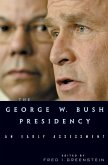An in-depth look at Bush's presidency by some of America's top historians
The Presidency of George W. Bush brings together some of today's top American historians to offer the first in-depth look at one of the most controversial U.S. presidencies. Emotions surrounding the Bush presidency continue to run high-conservatives steadfastly defend its achievements, liberals call it a disgrace. This book examines the successes as well as the failures, covering every major aspect of Bush's two terms in office. It puts issues in broad historical context to reveal the forces that shaped and constrained Bush's presidency-and the ways his presidency reshaped the nation.
The Presidency of George W. Bush features contributions by Mary L. Dudziak, Gary Gerstle, David Greenberg, Meg Jacobs, Michael Kazin, Kevin M. Kruse, Nelson Lichtenstein, Fredrik Logevall, Timothy Naftali, James T. Patterson, and the book's editor, Julian E. Zelizer. Each chapter tackles some important aspect of Bush's administration-such as presidential power, law, the war on terror, the Iraq invasion, economic policy, and religion-and helps readers understand why Bush made the decisions he did. Taking readers behind the headlines of momentous events, the contributors show how the quandaries of the Bush presidency were essentially those of conservatism itself, which was confronted by the hard realities of governance. They demonstrate how in fact Bush frequently disappointed the Right, and how Barack Obama's 2008 election victory cast the very tenets of conservatism in doubt.
History will be the ultimate judge of Bush's legacy, and the assessment begins with this book.
The Presidency of George W. Bush brings together some of today's top American historians to offer the first in-depth look at one of the most controversial U.S. presidencies. Emotions surrounding the Bush presidency continue to run high-conservatives steadfastly defend its achievements, liberals call it a disgrace. This book examines the successes as well as the failures, covering every major aspect of Bush's two terms in office. It puts issues in broad historical context to reveal the forces that shaped and constrained Bush's presidency-and the ways his presidency reshaped the nation.
The Presidency of George W. Bush features contributions by Mary L. Dudziak, Gary Gerstle, David Greenberg, Meg Jacobs, Michael Kazin, Kevin M. Kruse, Nelson Lichtenstein, Fredrik Logevall, Timothy Naftali, James T. Patterson, and the book's editor, Julian E. Zelizer. Each chapter tackles some important aspect of Bush's administration-such as presidential power, law, the war on terror, the Iraq invasion, economic policy, and religion-and helps readers understand why Bush made the decisions he did. Taking readers behind the headlines of momentous events, the contributors show how the quandaries of the Bush presidency were essentially those of conservatism itself, which was confronted by the hard realities of governance. They demonstrate how in fact Bush frequently disappointed the Right, and how Barack Obama's 2008 election victory cast the very tenets of conservatism in doubt.
History will be the ultimate judge of Bush's legacy, and the assessment begins with this book.









